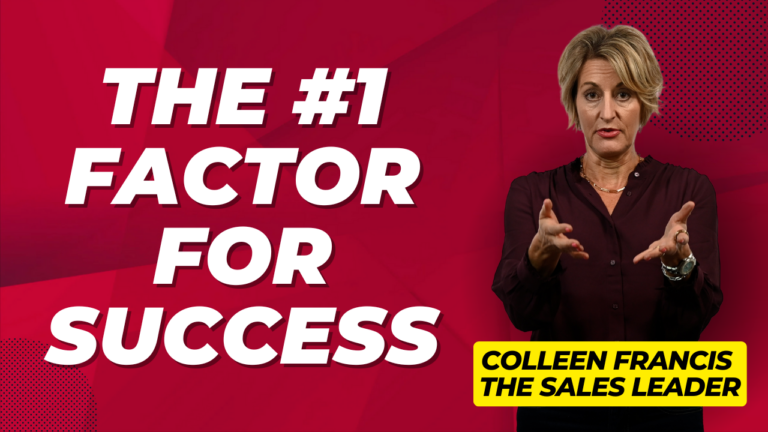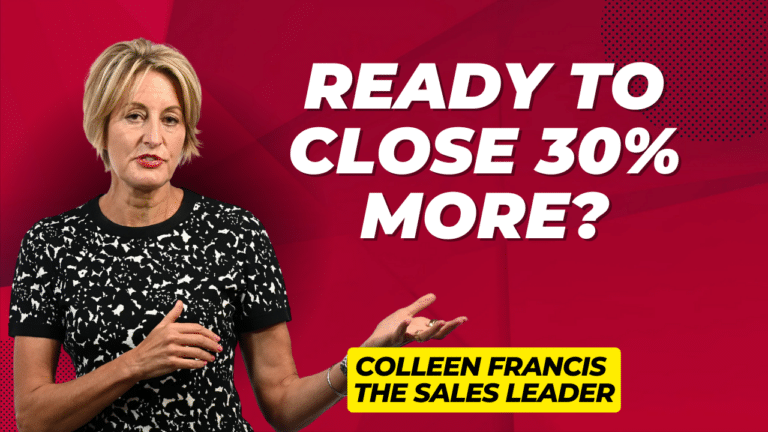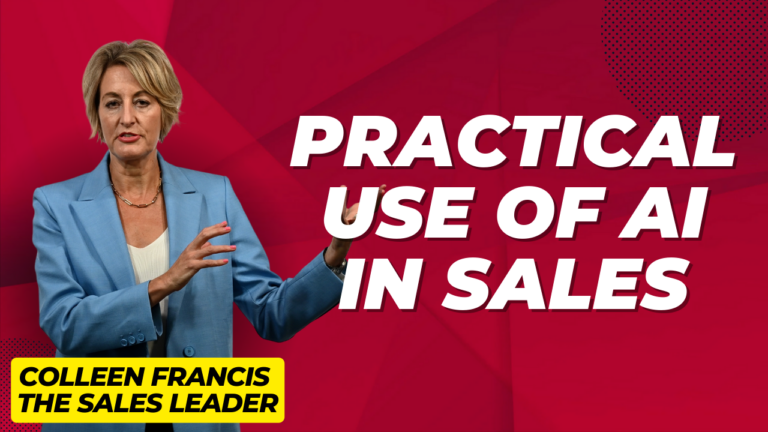The following was adapted from an interview conducted by Dan Walker, host of SalesRepRadio
– a weekly podcast offering tips, best practices and expert advice for sales professionals across
North America and around the world.
Q: As sales reps, one of the major obstacles we encounter in doing our
jobs is customer objections – having to overcome them, deal with them or move our prospects
away from their concerns.
Joining us today to address that very issue is the President and Founder of Engage Selling
Solutions, Colleen Francis. Colleen has delivered customized sales training programs to companies
all over the world and is an expert in dealing with and overcoming objections. Colleen, thanks
for taking the time to speak with us.
Colleen Francis: Thank you, it’s nice to be here.
Q: It really does seem today that objections have almost become a standard
part of the sales process. Is there any way to eliminate objections or at least reduce them?
Colleen: That’s a great question, Dan. I don’t think that objections will
ever be eliminated completely. However, we have developed several techniques that can help
you dramatically reduce the number of objections you get throughout the sales cycle.
The first thing to remember is that objections are a natural part of the sales process.
Put yourself in the consumer’s shoes for a minute, and think about the last time you made
a major purchase – a house, a car or maybe that Harley you always wanted.
It was a big investment, and you wanted to make sure you were making the right decision,
so you probably started second guessing yourself even before you made the purchase. Do I
really want to live in this neighborhood? Can I really afford those mortgage payments? Is
a convertible really a good idea when I live in Alaska?
Those are all objections, and objections are our brain’s natural reaction to the fear of
commitment. We all want to make sure we’re doing the right thing before we commit to do it.
Sales reps need to remind themselves that an objection doesn’t necessarily mean the prospect
is moving away from the sale. In fact, it may mean the prospect is getting close to making
a decision, and they’re just freaking out over the idea of spending all that money.
From a business viewpoint, the prospect is probably thinking to themselves: "I’m going to
be spending half a million dollars here; if this is the wrong decision, am I going to get
fired?" That’s an important thing to remember. Objections are going to come naturally, and
the larger ticket the item is that you’re selling or the more money you’re asking the prospect
to send, the more often those objections are going arise.
As for the second part of your question – while we may not be able to entirely eliminate
objections, yes, we can reduce the number of objections we get. The best way to do this is
to preempt your prospect.
Q: "Preempt your prospect" – can you explain that one to me?
Colleen: What I mean is that we as sales people can bring potential objections
up before the client gets a chance to.
For example, let’s say you’re selling a product that you know is in the top price range
among all your competitors. You need to bring that up early on in the sales process, by telling
your prospect something like: "Dan, you need to know that we’re not the cheapest product
on the market. You can always find someone who can deliver this service for less money than
we can. I can promise you that we will be competitive. Knowing that we are not the cheapest
option, does it make sense for us to go forward?"
Usually, the prospect will assure you that price isn’t their only consideration, and ask
you to continue with your discussion. And by bringing up that price objection early on, it
makes it very difficult for them to raise it later.
In fact, you can use this approach with almost any kind of objection. For instance, if you
find that many of your prospects object to your turnaround time, tell them early on: "A lot
of our clients are concerned about the time between placing an order and getting the product
delivered. Normally it takes us about six weeks. Is that going to be a problem for you?"
Or if you think they might object to displacing their current supplier, ask them: "How are
you going to justify switching companies to your CFO?"
Then talk them through those objections up front.
Q: What about provoking an objection? Are there any behaviors or approaches
that act like triggers to provoke objections?
Colleen: Yes. A lot of it is simply how you carry yourself through the
initial stages of the sales process.
The more questions you ask and the more involved the prospect is in the process, the less
likely they are to object. Similarly, the more often you’re able to provide a proposal or
presentation that gives the prospect the information they want or need, the more you focus
on them and the less likely they are to object as well.
One of the things we need to do when a prospect raises an objection or asks a question,
is help them discover the answer on their own. We do that by asking questions.
When a prospect says your price is too high, ask them: "How high is it? Have you found something
else on the market for less? Is price the only consideration?" In general, I recommend asking
three questions to help further define the objection and lead the customer to their own conclusions.
It’s also a good idea to script and practice your answers to the most common objections
in advance. I think it’s a real tragedy that most sales people aren’t prepared to handle
objections, because the reality is, there are only about three or four major objections that
tend to come up over and over again: "I’m not the decision maker," "I don’t have any money,"
"I don’t have any time" and "I don’t have any needs."
If you’re honest with yourself and look at all the objections you get on a regular basis,
you’ll see that they almost all fit into one of these four key categories. Yet in my experience,
more than 80 per cent of the sales reps out there are not prepared to deal with these four
common objections.
As sales professionals, we need to know our answers to these objections right up front.
And we need to document them, practice them, use them with our prospects and go back and
refine them.
As an added bonus, sometimes having good answers to a customer’s first questions can help
eliminate future ones in the sales cycle as well.
Q: How about a few quick tips for dealing with those objections?
Colleen: One of the best tips I can suggest is to always acknowledge that
the customer’s objection has a right to exist. If a prospect tells you that your prices are
too high, you can say: "Yes, you’re right. As I mentioned, our prices are not the lowest
in the industry. Did you find something lower from a competitor?"
When you support the client’s objection, it helps put them at ease and makes them more willing
to listen to the answer. In essence, we need to show them that we understand or acknowledge
the position they’re in before we can help move them away from their objection.
I might say something like: "Bob, I can understand that you’re not happy with the price,"
"I get a sense that the proposal I sent has made you uncomfortable," "I sense that the implementation
timeframe doesn’t fit your needs" or "I can appreciate why you’re concerned about our pay
up front policy."
Whatever it is they’re objecting to, give them the right to have the objection in the first
place, and then you can work through it together.
Q: A very good, common sense roadmap to dealing with those pesky objections.
Any final words of wisdom?
Colleen: I would encourage all sales reps to really focus on the prospecting
part of their business, because handling objections is much easier when you have a pipeline
full of business.
Having a full pipeline allows you to be creative, to take some risks and say to your prospects:
"If I can’t find a solution, does it mean it’s over between us?" It also allows you to walk
away from business or customers who are not going to be profitable.
Always keep this in mind: if a prospect has a habit of objecting to everything you say,
is that prospect going to be a good customer? A wise sales manager once told me: "Prospects
are not like fine wine; they don’t grow old gracefully."
I always say to my clients, if your customers or prospects are that difficult to deal with
before they’ve given you any money, imagine how they’re going to be as customers! Your time
is valuable, and you have to be willing and able to walk away from business that you don’t
think is going to be good for you or your company.
Q: Colleen Francis, thanks so much for the valuable insights.
Colleen: Thank you so much for having me.



